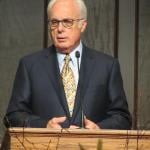John records Jesus’ ringing “It is finished” in his crucifixion narrative. But when he gets to Revelation, John records another declaration that things are “finished.” The angel who gives John the book to eat swears that “the mystery of God is finished” (Revelation 10:7). In context, the mystery of God has something to do with the renewal of creation, since the angel swears in the name of the Creator (v. 6). It’s also something that is about to happen, as... Read more
















